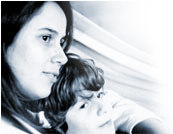 |
|||||||||||
|
|||||||||||
|
|||||||||||
| Midwifery
and Maternity Care |
|||||||||||
|
Midwifery
in Saskatchewan - An Update April 18, 2007 Midwifery Services - This Summer? On November 7, 2005, the Government of Saskatchewan's Speech from the Throne announced: "Over the years, government has heard from many, calling for new services in midwifery. In the coming months, support for midwifery services will be provided. Midwives will offer their skill and training as part of multi-disciplinary teams in hospital and community settings, contributing to care that is safe, flexible and meets the needs of families."Over the last year and a half, midwives, midwifery consumers, government officials and health professionals have been working diligently to bring midwifery to Saskatchewan.  The
provincial government will fund midwifery care provided by midwives who
will be hired staff of the Health Regions. Initially midwives had suggested
having independent practice, with payment per service or course of care,
as an alternative or complementary option to health region services that
would offer more independence and flexibility for midwives and clients.
The benefits of the chosen model are recognized, but there may be interest
on the part of midwives in also having other options available in the
future. The
provincial government will fund midwifery care provided by midwives who
will be hired staff of the Health Regions. Initially midwives had suggested
having independent practice, with payment per service or course of care,
as an alternative or complementary option to health region services that
would offer more independence and flexibility for midwives and clients.
The benefits of the chosen model are recognized, but there may be interest
on the part of midwives in also having other options available in the
future. The intent is to have midwifery services available throughout the province, but the government is starting with two initiation sites. The Regina site may be operational as early as June 2007, and the Saskatoon site will likely follow later. The Midwifery Act was passed in 1999. Parts of the Act were finally proclaimed this winter, to enable the formation of a Transitional Council. The government can proclaim the rest of the Act when the regulations, bylaws etc are ready, the Legislature does not have to be sitting. One cannot predict political decisions, but the NDP government is nearing the end of its current mandate, and a spring or fall election is possible in the province, which would influence the current government decisions on proclamation. Saskatchewan Health had set up the Midwifery Implementation Committee to guide the establishment of midwifery. The Committee was composed mainly of representatives of health professional organizations, and had one consumer representative participating for a time. Working groups have been addressing:
An important difficulty determined as the regulations were being developed is that the definition of midwifery practice in the Midwifery Act does not mention care of the mother and infant after birth, or well woman care. "Authorized practices - 23(1) Subject to the terms, conditions and limitations of that member's licence, a member may perform the following authorized practices: (a) act as a primary care giver in managing pregnancy and labour, including the spontaneous normal vaginal delivery of a baby;" http://www.qp.gov.sk.ca/index.cfm?fuseaction=publications.details&p=2788 Midwives and consumers would prefer that the Act be amended before it is proclaimed, so the definition is complete, for the sake of clarity and liability. On the other hand, an amendment does not seem to be on the Legislative Agenda for the Spring 2007 session, including it at this time would require the approval of the Government and Opposition parties, delaying it until the Fall session would delay midwifery implementation. A bursary has been established by Saskatchewan Health to enable midwives to access training or prior learning assessment (http://www.health.gov.sk.ca/hhrp_bursaries.html). Two midwives used the bursary to access the International Midwives Pre-Registration Program in Toronto, which offers rigorous academic and clinical skills assessment. The Western Academy of Midwifery was initiated in the Fall of 2006 and began accepting students in January 2007. From its home in Regina, with the involvement of midwives and other experienced educators from Canada and the U.S., WAM will provide a 4-year distance education program in academic and clinical requirements for Canadian midwifery practice. Second attendant and doula training is also offered. (http://www.wamidwifery.com/) The progress of the Aboriginal Midwifery Education Program in Manitoba has been viewed with great interest. The work of AMEP led to the formation of the Kanácí Otinawáwasowin (Aboriginal Midwifery) Baccalaureate Program (KOBP) at the University College of the North, with its two main campuses in Thompson and The Pas, Manitoba. (https://www.keewatincc.mb.ca/) Upcoming topics that will need to be addressed:
For more information email pwhce@uregina.ca, tel: (306) 585-5727. Or mail: Prairie Womens Health Centre of Excellence CB 309 College Building University of Regina Extension College & Scarth Regina, Saskatchewan S4S 0A2 |
|||||||||||
This website is
copyrighted by the Prairie Women's Health Centre of Excellence, © 1998-2011.
Website design: Pamela Chalmers E-mail: pwhce@uwinnipeg.ca. |
|||||||||||
 |
|||||||||||

